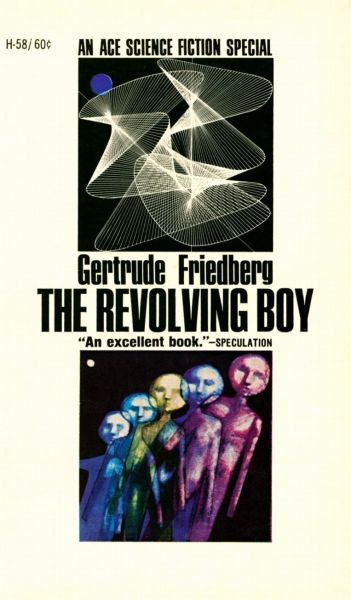Spin Me Round
The Revolving Boy
By Gertrude Friedberg

24 Sep, 2023
Gertrude Friedberg’s 1966 The Revolving Boy is a stand-alone near-future juvenile SF novel.
Derv Nagy was born with an infallible sense of direction. This knack comes with a cost. Derv’s parents fear their son has not yet discovered the full extent of that cost.
In addition to a perfect sense of direction and distance, Darv is also hyper-aware of rotation. For reasons he cannot explain, he is compelled to keep his net rotations zero. Living as he does on a planet that spins while it orbits a star travelling through the Milky Way, he is forced to embrace peculiar behaviors to satisfy this urge.
Mr. and Mrs. Nagy treasure their privacy1. They have a suspicion about the cause of Derv’s gift, but fearing the consequences of frankness, prefer to withhold this information until circumstances force their hand. Perhaps the situation will resolve itself.
Lacking parental guidance, Derv is forced to explore the limits of his ability on his own. Fortuitously for Derv, he befriends adults who are willing to indulge his curiosity and give him access to an antigravity chamber. This allows Derv to establish what it is he orienting himself with respect to: a seemingly unremarkable patch of sky. On close examination, that apparently empty region of space is the source of what may be an alien signal.
Mr. and Mrs. Nagy finally relent. They reveal that they used to be known as Mr. and Mrs. Yang. The Yangs were astronauts, from an age before nuclear testing made orbit too dangerous for humans. They took part in a test to see if humans could reproduce in space. Derv was the result.
The scientists know one thing about the signal: its direction. The distance of the source, whether the signal is a message, the nature of the senders, all unknown. Perhaps Derv can assist them in their studies.
Alas for science, the Nagys hate publicity. Changing their names to Gany, they go into hiding. This is the last science hears of Derv … until sixteen years later, when the signal suddenly stops.
~oOo~
Clute, in the Encyclopedia of Science Fiction, describes this novel as a “fine SF novel” and “a minor classic.” I was happy to discover a copy of the Ace mass market version, because while I had read the 1980 Del Rey paperback, I remember almost nothing about it2. Having reread the novel, I don’t know what Clute sees in this novel.
The world building is … probably no worse than that in many contemporary SF novels. The author expects a period of reaction to 1960s excess. She mentions in passing a constitutional amendment that ensures freedom from the press. It feels like there’s a story in that amendment but it is not explored. The author’s guesses as to what modern conveniences would be invented are, as usual, entertaining but wrong3. There is also the odd bit that in this setting, people choosing false names invariably pick anagrams of their old names, which is not a notion I’ve encountered anywhere else4.
The prose is simplistic, which might be because it was aimed at a young audience (although in general Ace Specials were not juveniles, so maybe I am wrong).
The plot is driven by needless obstructionism. There really isn’t any reason the Yang/Nagy/Gany family need fear the authorities. Nevertheless, they behave as though at any moment the police will batter down their door and drag them off to the special prison for people with ineffective pseudonyms and an inherent sense of direction.
One must grant, however, that the novel does a nice job of depicting the effects of irresistible obsession and how people manage it or don’t. Derv works out how to accommodate his need to turn in ways that do not attract attention. Mr. Yang/Nagy/Gany in contrast is utterly unable to deal with his loathing of publicity and unwanted news except by becoming a recluse and limiting what his wife is permitted to tell him.
The Revolving Boy is out of print.
1: The parents’ desire for privacy may be why we never learn their first names.
2: In the 1980 Del Rey version of this novel, the dates in the text may have been altered to futurify the 1980 edition. In the Ace version, Derv was born in 1970, vanishes in 1986, and reappears sixteen years later. I gather that in the Del Rey, he vanishes in 2015 and reappears in the 2030s.
3: One of the imagined future inventions: disposable bed clothes that could unrolled like saran wrap from a roller. I believe that this innovation was also featured in William Pène du Bois’s 1947 The Twenty-One Balloons. It’s been a very long time since I read the du Bois and I may be misremembering. I wonder if Friedberg was inspired by du Bois?
4: Derv ultimately reinvents himself as Fred Gany. A cynic would wonder if the author planned to rename her protagonist Fred Gany all along, and named him Derv Nagy so she’d have the letters available to anagramically rearrange into the desired final name.
The whole “cover names are always anagrams of the original name” is an odd detail.
